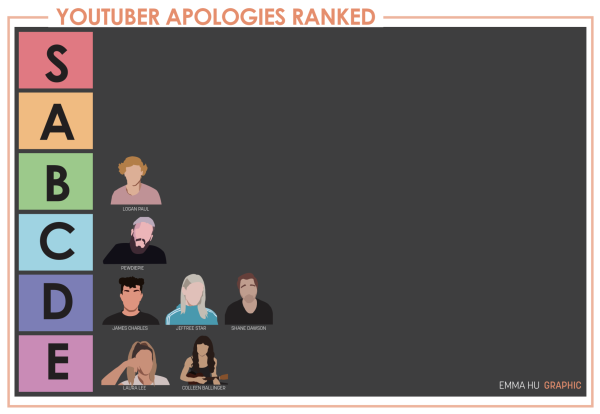As social media influencers rise in popularity, their scandals are often exposed to the public, which prompts them to deliver tear-filled and shallow responses to serious allegations like grooming or racism. This has become especially prevalent over the past couple years, with entire playlists and videos dedicated to analyzing these apologies. These apologies, however, vary widely in their sincerity, effectiveness and the subsequent actions that follow. Examining a few notable examples sheds light on the complexities of this digital ritual.
One of my personal favorite influencer apologies comes from beauty guru James Charles. In 2019, Charles faced allegations of inappropriate behavior towards minors, triggering a public backlash. His apology video, titled “tati,” attempted to address the accusations and salvage his reputation. Most people reacted negatively to this apology, deeming it insincere, performative and phony. The aftermath of the apology saw Charles losing millions of subscribers, showcasing the tangible consequences of a poorly executed apology. The reason this one stands out to me is because of the utter lack of accountability coming from Charles. Charles was accused of basically grooming minors and reacted by making himself the victim and almost wholly denying wrongdoing, despite there being photographic evidence of his disgusting actions. The deluded and conceited nature of this apology truly summarizes an entire subsection of influencers who only look out for themselves and their livelihoods. It’s even more telling that James Charles returned to YouTube earlier this year pretending like the entire controversy didn’t happen, which further supports how most apologies are truly nothing more than desperate pleas to retain relevancy and not genuine acceptance of wrongdoing.
In contrast, YouTuber Jenna Marbles demonstrated a different approach in 2020 when she uploaded her video titled “A Message.” Marbles took responsibility for past offensive content, expressing genuine remorse and announcing her decision to step away from her channel. Her humility and commitment to personal growth resonated with audiences, earning her respect and understanding. Marbles’ case highlights the potential for Youtuber apologies to serve as catalysts for positive change when approached with authenticity.
The effectiveness of Youtuber apologies often hinges on the individual’s ability to learn, grow and make amends. But most of the time, these crucial characteristics of an apology are not executed. For example, Shane Dawson, known for his dark humor and past controversies, faced massive scrutiny for old videos featuring racially insensitive content, ranging from blackface to incredibly racist remarks. His lengthy apology video, “Taking Accountability,” aimed to address the issues, but skepticism lingered due to a lack of concrete actions. The subsequent disappearance of Dawson from the platform raised questions about the authenticity of his commitment to change.
In conclusion, Youtuber apologies have become a significant aspect of online culture, reflecting the power dynamics between creators and their audience. While some apologies resonate with authenticity and foster redemption, most fall flat, perpetuating skepticism, criticism and disappointment from fans who looked up to these entertainers. As audiences become more discerning, the success of Youtuber apologies will increasingly depend on genuine accountability, meaningful actions and a commitment to positive change beyond the confines of a tear-filled video apology.

Logan Paul: His apology for the notorious suicide forest scandal was seemingly genuine, but still lacked true accountability. However, since the original scandal, he has shown change and seems to have grown from his past.
PewDiePie: This apology video seems pretty genuine and is done professionally—something most of the other creators lack—but since the video was uploaded, people have called him out for repeating the same actions.
James Charles: There isn’t any fake crying and he takes partial credit for his wrongdoing, but there’s still apparent denial for his actions.
Jeffree Star: The situation he’s apologizing for is lighter than the rest being internet drama with James Charles, but he’s also gotten into way too much trouble on the internet and every time he never seems to learn.
Shane Dawson: One of the most embarrassing YouTube apologies of all time—it’s blatantly obvious throughout the entire video how unapologetic he really is.
Laura Lee: The apology was full of fake crying, and victimizing herself and she didn’t actually address the racism.
Colleen Ballinger: She doesn’t actually apologize and denies harassing minors and she turns the whole situation into a joke by singing her song.
The views in this column do not necessarily reflect the views of the HiLite staff. Reach Mahitha Konjeti at mkonjeti@hilite.org and Emma Hu at ehu@hilite.org.































![What happened to theater etiquette? [opinion]](https://hilite.org/wp-content/uploads/2025/04/Entertainment-Perspective-Cover-1200x471.jpg)













































![Review: “The Immortal Soul Salvage Yard:” A criminally underrated poetry collection [MUSE]](https://hilite.org/wp-content/uploads/2025/03/71cju6TvqmL._AC_UF10001000_QL80_.jpg)
![Review: "Dog Man" is Unapologetically Chaotic [MUSE]](https://hilite.org/wp-content/uploads/2025/03/dogman-1200x700.jpg)
![Review: "Ne Zha 2": The WeChat family reunion I didn’t know I needed [MUSE]](https://hilite.org/wp-content/uploads/2025/03/unnamed-4.png)
![Review in Print: Maripaz Villar brings a delightfully unique style to the world of WEBTOON [MUSE]](https://hilite.org/wp-content/uploads/2023/12/maripazcover-1200x960.jpg)
![Review: “The Sword of Kaigen” is a masterpiece [MUSE]](https://hilite.org/wp-content/uploads/2023/11/Screenshot-2023-11-26-201051.png)
![Review: Gateron Oil Kings, great linear switches, okay price [MUSE]](https://hilite.org/wp-content/uploads/2023/11/Screenshot-2023-11-26-200553.png)
![Review: “A Haunting in Venice” is a significant improvement from other Agatha Christie adaptations [MUSE]](https://hilite.org/wp-content/uploads/2023/11/e7ee2938a6d422669771bce6d8088521.jpg)
![Review: A Thanksgiving story from elementary school, still just as interesting [MUSE]](https://hilite.org/wp-content/uploads/2023/11/Screenshot-2023-11-26-195514-987x1200.png)
![Review: "When I Fly Towards You", cute, uplifting youth drama [MUSE]](https://hilite.org/wp-content/uploads/2023/09/When-I-Fly-Towards-You-Chinese-drama.png)
![Postcards from Muse: Hawaii Travel Diary [MUSE]](https://hilite.org/wp-content/uploads/2023/09/My-project-1-1200x1200.jpg)
![Review: "Ladybug & Cat Noir: The Movie," departure from original show [MUSE]](https://hilite.org/wp-content/uploads/2023/09/Ladybug__Cat_Noir_-_The_Movie_poster.jpg)
![Review in Print: "Hidden Love" is the cute, uplifting drama everyone needs [MUSE]](https://hilite.org/wp-content/uploads/2023/09/hiddenlovecover-e1693597208225-1030x1200.png)
![Review in Print: "Heartstopper" is the heartwarming queer romance we all need [MUSE]](https://hilite.org/wp-content/uploads/2023/08/museheartstoppercover-1200x654.png)


